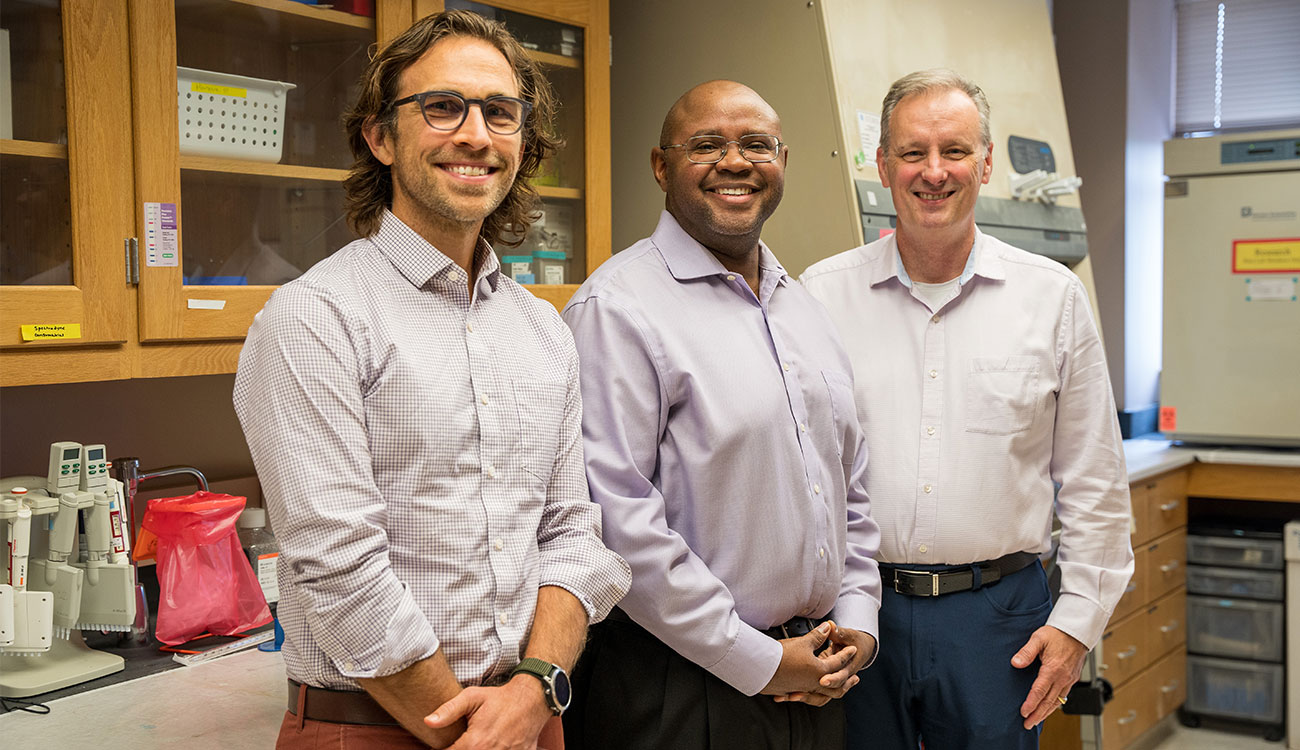Erin Kaiser
-

Traumatic brain injury (TBI) represents a major global health issue contributing to significant disability and mortality. The TBI-induced secondary injury cascade, characterized by neuroinflammation, neural cell death, and tissue damage, results in lifelong functional deficits. Alpha-N-[(R)-1, 2-dithiolane-3-pentanoyl]l-glutamyl-l-alanine (CMX-2043) is a novel alpha lipoic acid (ALA)-based therapeutic that has neuroprotective, anti-apoptotic, and anti-inflammatory properties that mitigate…
Posted in: Publications -

Researchers in the TNRR Laboratory found a new drug that may boost the brain’s ability to heal itself after injury. The discovery could lead to significant advances in treating traumatic brain injuries, or TBIs. For the full article, please click on the following link: https://news.uga.edu/new-compound-may-help-the-brain-heal-itself/
Posted in: News and Events -

Traumatic brain injury (TBI) is a leading cause of death and disability worldwide, and is indiscriminate in who it affects, including children. Although there are currently no Food and Drug Administration-approved therapeutics, promising results from recent induced pluripotent stem cell-derived neural stem cell (iNSC) studies have demonstrated decreased tissue damage and functional deficits in pre-clinical…
Posted in: Publications -

This study examines the neuroprotective effects of the novel antioxidant alpha lipoic acid-based therapeutic, CMX-2043, on antioxidant enzymes in a preclinical TBI model via various drug administration routes. Specifically, intravenous administration enhanced liver catalase and brain SOD activity, while subcutaneous administration primarily elevated brain catalase activity. In addition, this study shows an association between increased brain…
Posted in: Publications -

The ability of the brain to perform multiple complex tasks with fixed structures has yet to be fully elucidated. Structural connectivity (SC) and functional connectivity (FC) have been increasingly used to understand the structure and function of the brain respectively. However, a limited number of studies have explored the relationship between both entities especially in…
Posted in: Publications -

Human neural stem cells (hNSCs) possess significant therapeutic potential for the treatment of traumatic brain injury (TBI), a leading cause of global death and disability. Recent pre-clinical studies have shown that hNSCs reduce tissue damage and promote functional recovery through neuroprotective and regenerative signaling and cell replacement. Yet the overall efficacy of hNSCs for TBI…
Posted in: Publications -

University of Georgia researchers, including TNRR member Dr. Franklin West, have received a $3.7 million award to study the therapeutic efficacy of mesenchymal stem cells (MSCs) for the treatment of traumatic brain injury (TBI). Click this link to read the full story!
Posted in: News and Events -

In this study, we evaluated the effects of induced pluripotent stem cell-derived neural stem cell (iNSC) treatment on cellular, tissue, and functional recovery in a translational controlled cortical impact TBI piglet model. At 12-weeks post-transplantation, iNSCs showed long-term engraftment and differentiation into neurons, astrocytes, and oligodendrocytes. iNSC treatment enhanced endogenous neuroprotective and regenerative activities indicated…
Posted in: Publications -

Maternal nutrition during the perinatal stage is critical to offspring brain development. Egg yolks are a balanced and nutrient-dense food that is rich in bioactive components crucial to optimal neurodevelopment early in life. Egg consumption is often recommended to pregnant women to enhance both maternal and fetal health. The findings from this study support egg…
Posted in: Publications -

To better understand TBI’s impact on brain function and assess the efficacy of treatments, this study uses a novel temporal-spatial cross-group approach with a porcine model, integrating resting-state functional magnetic resonance imaging (rs-fMRI) for temporal and arterial spin labeling for spatial information. Read more about these results by clicking on the following link: https://pubmed.ncbi.nlm.nih.gov/39036426/.
Posted in: Publications